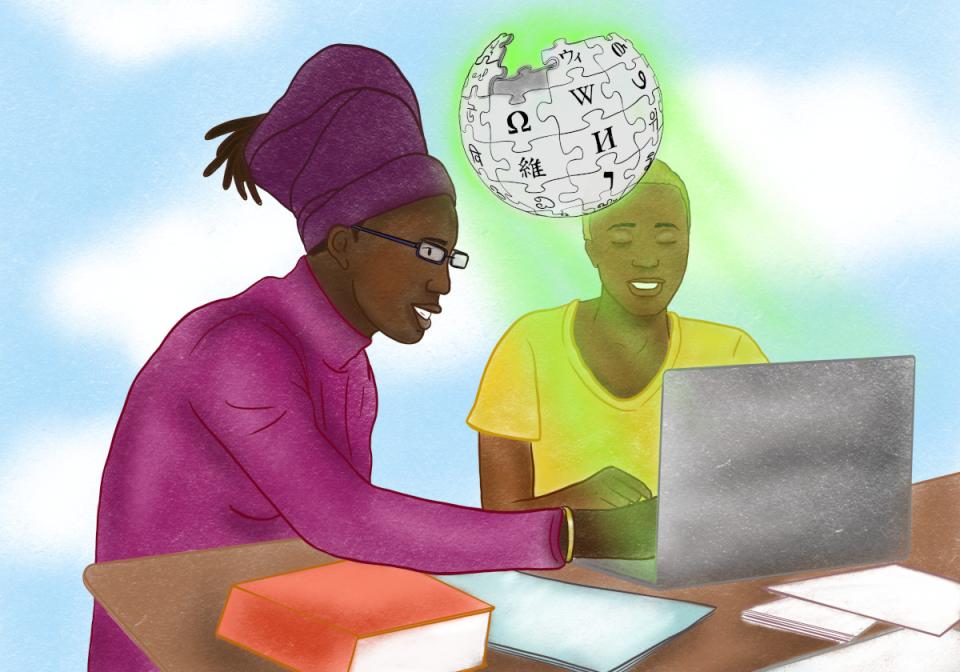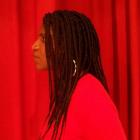
Original illustration by Neema Iyer for this edition of GenderIT. License: Creative Commons BY-NC-SA.
The project
The project “Ennegreciendo Wikipedia” (Blackening Wikipedia) is part of other efforts I conduct to blacken spaces. The performances I stage on the subject of blackness and its lack of positive representation in art spaces are, in fact, the artistic expression of the aims of the project I am carrying out within the online encyclopedia.
When Wikipedia, the collaborative encyclopedia, came along it broke the traditional model for sharing and contributing knowledge and information. But we have sometimes wondered what kinds of information, what sources of knowledge, what knowledges are featured in the online encyclopedia, given that, as is the case with all global media, Eurocentric knowledge, discourse and epistemology dominate this encyclopedia too. And this Eurocentric knowledge is in turn based on the construction of successive and multiple separations, the most significant of which, although not the only ones, are the basic hierarchical dualisms, such as reason-body, subject-object, culture-nature and masculine-feminine.La colonialidad del saber: Eurocentrismo y ciencias sociales. Perspectivas latinoamericanas. Compilación:Edgar Lander. Año 2000
...we have sometimes wondered what kinds of information, what sources of knowledge, what knowledges are featured in the online encyclopedia...
This linear and highly segregated narrative of human history does not match the multiple and diverse knowledges that populate this planet. Holding a Eurocentric history up as world history and historical truth entails granting continuity to colonialism. It negates the history and knowledges of other parts of the planet, from both pre-colonial and current times. That is without considering the vast number of appropriations, simulations, stolen ideas and inventions, intellectual expropriations and negationist devices that have been used throughout history to erase the contributions from other cultures, such as those made by different African cultures, to so-called “world” history. But there were and still are different forms of organising social life and productive resources. Other ways of conceiving time, other cosmogonies. A different relationship with nature, one without ruptures or dualisms.
The goal of “Blackening Wikipedia” is to create more pages in the online encyclopedia with other views of the global South and of the deep South, the South that lies at the very heart of the colonialist metropolises, the South of the oppressed and marginalised groups. I am the founder of this project, which a profound human conviction within me inspired me to start, and as I moved forward with it I was fortunate enough to be joined by Gala Mayí-Miranda, a specialist in Caribbean art who holds a master’s in art history and who is now helping me organise it. We work toward a pluriversal, anti-patriarchal and decolonised encyclopedia. That is, what Wikipedia so far is not.
Right now the project is available in three languages: Spanish, French and Catalan. In this first year and a half, we have produced over 70 pages in French and some 20 pages in Spanish. Most are about African women or women of African descent. For that reason, I was invited to the Digital Women’s Day held in Senegal in June 2018. The aim is to engage our community and weave a global collaborative network.
The project is available in three languages: Spanish, French and Catalan. In this first year and a half, we have produced over 70 pages in French and some 20 pages in Spanish. Most are about African women or women of African descent.
The day-to-day effort of blackening Wikipedia
How do we go about blackening Wikipedia in our day-to-day?
- Remedying the lack of references, pages and information on Africanness, the African diaspora and Afro-descendents, pre-colonial history and pluriversal knowledges. The criteria for assessing information sources and validating those sources and knowledges are in the hands of an essentially European and Anglo-Saxon community. The validation methods or criteria need to be changed and that is done by contributing more and more sources from studies and experiences conducted in the periphery of Eurocentrism, by its means of communication and dissemination and its academies. For example, the biography of the Afro-Peruvian artist Victoria Santa Cruz is one of the many cases in which there is almost no information on her works, due to a lack of sources from national publications that would make it possible to improve it.
- Increasing the presence of African and Afro-descendant Wikipedians in the online encyclopedia to tell our story, in our voices and with sources of information and knowledge. To achieve this, it is essential that the legacy of our ancestors and our common origin – Africa – be written, disseminated and valued primarily by us.
- Revising and drafting pages with a decolonialised, racially aware and anti-patriarchal approach:
- Eradicating gender, colour and/or origin-related euphemisms.
- Giving vital importance to the introductory summary of the pages. Our cultures and their contributions are often downplayed in the introductory summaries in which they are mentioned. We must work on improving those summaries.
- Identifying the historical invisibility and negative visibility of the Afro-community.
- The omitting, masking and subordinating of our contributions and our history is something we must eradicate, along with sexist and racist epistemologies and their offshoots.
- Making pre-colonial history visible (including geopolitics, social organisation, philosophies, religions and so on).
- Inclusion of theories, knowledges and concepts generated through the questioning of the hegemony of Eurocentric thinking and the patriarchal system.
- Emphasising the contributions of women rather than their family-related condition.
- Including gender diversities.
- Avoiding stereotyped content.
- Reducing the gender gap (fields of knowledge, the content of the entries, accumulated gaps).
The validation methods or criteria need to be changed and that is done by contributing more and more sources from studies and experiences conducted in the periphery of Eurocentrism, by its means of communication and dissemination and its academies.
Promoting this initiative to blacken Wikipedia
If you are among those who believe this is a necessary project, then join us. Contribute literature by our African writers and by writers of the African diaspora: biographies, encyclopedias, geopolitical and geographical studies, etc.; any and all information that concerns our blackness.
Come to our workshops and learn how to create Wikipedia pages.
Teachers, researchers, students or any individual member of a group or association can use their writing skills to create, modify or revise pages that contain euphemisms, erroneous historical data or invisibilised facts about our culture.
The transmission and translation within Wikipedia is very important for regional languages and, within the project, for languages developed by descendants of African slaves. These languages are the result of a will to resist against the wiping out of our native languages. We owe it to our ancestors!
Wikipedia can be used as an educational tool, stimulating students to critically examine and analyse its content, teaching them to look for bibliographic sources with which to modify articles or generate new ones and making them aware of the political, cultural and sociological scope of this global encyclopedia, where our cultures and our history in general are misrepresented or underrepresented.
Teachers, researchers, students or any individual member of a group or association can use their writing skills to create, modify or revise pages that contain euphemisms, erroneous historical data or invisibilised facts about our culture.
The challenges ahead
In Wikipedia we find a Wikipedian community that is a reflection of the world. Most of its editors are from the West and have easy access to the internet and living standards that allow them to devote a certain amount of free time, with more or less dedication, to the online encyclopedia.
The patriarchal model creates a huge gender gap, with the burden of domestic and educational work continuing to fall heavily on women. Thus, women have had and still have less free time to devote to Wikipedia.
This gap is compounded by the problems generated by the socioeconomic system, including:
- The more than established difficulties that a large part of the African continent has in terms of internet access.
- The fact that part of the Wikipedian community – emphasis on part – is unaware of the challenge that digitalising files and bibliographic sources pose outside of the Western world.
- The Eurocentric criteria for noteworthiness that affect issues or personalities from Africa or the African diaspora and their Afro-descendents.
- The lack of recognition of literary sources and websites that are not from the West or are not mentioned in an article by Western media.
- The economic conditions of the subordinated majorities as a result of racism and exclusion in the West and beyond.
- The difficulty in acknowledging theories, philosophical movements and the such that have not been validated, transcribed or interpreted by Western philosophers or thinkers.
- Western intellectuals’ and thinkers’ resistance to a critical revision of history and the epistemology of capitalist patriarchal modernity, a resistance also shared by part of the Wikipedian community.
- The insufficient affirmative actions conducted by the Wikimedia Foundation, in regions such as the Caribbean and South America, in favour of groups that have difficulties accessing the internet. More financial and logistical means must be made available to them, and capacity building on Wikipedia for community stakeholders, within and by their communities, must be enhanced. The Wikimedia Foundation still tends to support more initiatives by the oldest Wikipedians, who are active in the same geographic and power spaces, thus enormously limiting the inclusion of new knowledges in the online encyclopedia, and seemingly forgetting how the first Wikipedians began.
- Finally, I do not want to leave out the challenge involved in raising awareness in our communities about the importance of our presence in all spaces of knowledge. We need to be present in academia, on the street, in the economy, in art, in everything. We need to recognise and self-validate our history, the legacy of our ancestors; we need to rebuild ourselves in a multitude of proud peoples, to build a better day-to-day.
The patriarchal model creates a huge gender gap, with the burden of domestic and educational work continuing to fall heavily on women. Thus, women have had and still have less free time to devote to Wikipedia.
Wikipedia is a power in which mental and intellectual colonialism can be perpetuated if we fail to counteract the penetration of one-sided thinking in the minds of our contemporaries and of future generations. The project needs associations, groups, movements of intellectuals, study centres, researchers, activists, thinkers and individuals who are part of our blackness, working from our blackness.
Wikipedia will be plural or it will not be at all!
- 9321 views






Add new comment